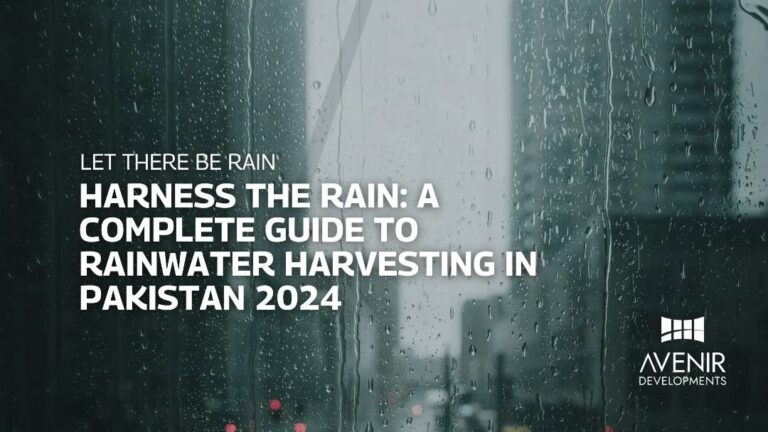Rainwater harvesting is a time-tested method of capturing and storing rainwater for later use. In a country like Pakistan, where water scarcity is a growing concern, this practice has become increasingly important. By effectively harnessing the rain, we can alleviate pressure on our dwindling water resources, reduce our reliance on municipal supplies, and contribute to a more sustainable future.
I’ve spent countless hours on rooftops and construction sites across Pakistan, witnessing firsthand the challenges our country faces due to water scarcity. It’s a problem that affects everyone, from farmers struggling with crop failures to urban dwellers facing water shortages during dry spells. Rainwater harvesting is a practical and effective solution that can make a significant difference.
In this comprehensive guide, I’ll delve into the world of rainwater is harvested, exploring its benefits, challenges, and practical implementation. Whether you’re a homeowner looking to reduce your water bill or a business owner seeking sustainable solutions, this article will provide you with valuable insights and actionable steps.
Let’s embark on this journey together and discover how you can harness the rain to create a more water-secure future.
Rainwater Harvesting Tool in Pakistan
At Avenir Developments, we have developed a Rainwater Harvesting tool for Pakistan. Calculate Your Rainwater Harvesting Potential in Pakistan Harness the power of monsoon rains and unlock a sustainable water source for your property with Avenir Developments’ Rainwater Harvesting Calculator! Discover how much precious water you can collect and utilize, contributing to a greener future for Pakistan and significant savings on your water bills.
A Deep Dive into Rainwater Harvesting
Rainwater harvesting, a practice as old as civilization itself, has gained renewed significance in our era of water scarcity. This age-old technique involves the collection and storage of rainwater for various purposes, from domestic use to agriculture and industrial applications. In Pakistan, where water resources are under immense pressure due to factors like population growth, climate change, and inefficient water management, harvesting rainwater emerges as a compelling solution.
Historically, our ancestors in the Indus Valley Civilization were pioneers in water management, developing intricate systems to capture and store rainwater. Their ingenuity in constructing reservoirs and canals serves as a testament to the importance of water conservation in our region. However, with urbanization, deforestation, and changing rainfall patterns, the traditional methods of harvesting rainwater have become less effective.
Today, rainwater harvesting is experiencing a resurgence as a sustainable and practical approach to water management. By capturing rainwater from rooftops, landscapes, and other surfaces, we can reduce our reliance on conventional water sources, mitigate the impacts of floods, and recharge groundwater aquifers.
It’s essential to recognize that rainwater harvesting is not a standalone solution but a vital component of a comprehensive water management strategy. When integrated with other water conservation measures, it can yield significant benefits for both individuals and communities.
The Evolution of Rainwater Harvesting in Pakistan
Pakistan’s journey with rainwater harvesting is a testament to our nation’s resilience in the face of water scarcity. While ancient civilizations like the Indus Valley had sophisticated water management systems, the practice declined over centuries due to various factors. However, the growing water crisis has reignited interest in this age-old technique.
In recent decades, there has been a surge in awareness about the importance of rainwater harvesting in Pakistan. Government initiatives, NGOs, and individual efforts have contributed to the adoption of this practice on a larger scale. The development of innovative technologies and the availability of affordable rainwater harvesting systems have further accelerated its growth.
However, challenges persist. Factors such as urbanization, climate change, and uneven rainfall distribution continue to hinder the widespread implementation of rainwater harvesting. Moreover, there is a need for greater public awareness and education about the benefits and techniques of rainwater harvesting.
To address these challenges, it is crucial to strengthen government policies and incentives to promote rainwater harvesting. Investing in research and development to improve rainwater harvesting technologies is also essential. Furthermore, fostering collaboration between government, private sector, and communities can accelerate the adoption of this sustainable practice.
By learning from the past and adapting to the present, Pakistan can harness the full potential of rainwater harvesting and secure a water-secure future for generations to come.
Frequently Asked Questions About Rainwater Harvesting in Pakistan
Q: What are the benefits of rainwater harvesting for homeowners in Pakistan?
Rainwater harvesting offers numerous benefits for homeowners in Pakistan. It can significantly reduce your water bills, as you’ll be relying less on municipal water supplies. Additionally, it helps conserve precious groundwater resources, contributing to a more sustainable future. By reducing your water consumption, you’re also doing your part to alleviate pressure on the overall water infrastructure. Rainwater is naturally soft and free from chemicals, making it ideal for gardening, cleaning, and other household tasks.
Q: How much does a rainwater harvesting system cost in Pakistan?
The cost of a rainwater harvesting system in Pakistan varies depending on the size of your home, the desired storage capacity, and the complexity of the installation. Simple systems with small storage tanks can be relatively affordable, while larger systems with advanced features may require a higher investment. However, the long-term savings on water bills often offset the initial cost.
Q: Is rainwater safe to drink?
While rainwater can be safe to drink after proper treatment, it’s generally recommended to use it for non-potable purposes like gardening, flushing toilets, and car washing. The quality of rainwater can vary depending on factors such as the condition of your roof and the surrounding environment. To ensure the safety of drinking rainwater, it’s essential to install a proper filtration and purification system.
Q: How can I encourage my community to adopt rainwater harvesting?
Raising awareness about the benefits of rainwater harvesting is crucial to promoting its adoption within your community. You can organize workshops, seminars, and educational campaigns to inform people about the practice. Sharing success stories and testimonials can also inspire others to implement rainwater harvesting systems. Collaborating with local government officials and community leaders can help create supportive policies and incentives.
Q: Are there government incentives for rainwater harvesting in Pakistan?
While specific government incentives may vary depending on the region, there is growing recognition of the importance of rainwater harvesting in Pakistan. Some areas offer subsidies or tax breaks for installing rainwater harvesting systems. It’s essential to check with your local government to see if any incentives are available in your area.
Expert Tips for Rainwater Harvesting in Pakistan
With over two decades of experience in the construction industry in Pakistan, I’ve witnessed firsthand the challenges posed by water scarcity. Rainwater harvesting is a practical solution that can significantly benefit homeowners and businesses alike. Here are some expert tips to help you maximize the benefits of this sustainable practice:
- Assess your needs: Determine your water consumption patterns and the size of your property to select the appropriate rainwater harvesting system.
- Choose the right location: Select a suitable location for your rainwater storage tank, considering factors like accessibility, sunlight exposure, and potential flooding.
- Invest in quality components: Opt for high-quality materials for your gutters, downspouts, and storage tanks to ensure durability and efficiency.
- Regular maintenance: Clean your gutters, downspouts, and storage tanks regularly to prevent clogging and maintain water quality.
- Consider water treatment: If you plan to use harvested rainwater for drinking or cooking, invest in a reliable water treatment system.
- Educate your community: Spread awareness about the benefits of rainwater harvesting and encourage your neighbors to adopt this practice.
- Explore government incentives: Check for available government subsidies or tax breaks to offset the initial cost of your rainwater harvesting system.
- Monitor water quality: Regularly test the quality of your harvested water to ensure it meets your needs.
By following these tips, you can effectively harness the power of rainwater and contribute to a more sustainable future for Pakistan.
Harnessing the Rain for a Brighter Future
Rainwater harvesting is more than just a trend; it’s a necessity for a sustainable future in Pakistan. By capturing and utilizing this precious resource, we can alleviate water scarcity, protect our environment, and build resilient communities.
From reducing your water bills to contributing to groundwater recharge, the benefits of rainwater harvesting are manifold. By implementing effective rainwater harvesting systems, you’re not only taking care of your own needs but also playing a vital role in preserving our planet’s most precious resource.
Ready to unlock the power of rainwater? The best architects and interior designers, Avenir Developments offer comprehensive rainwater harvesting solutions tailored to your specific needs. Our team of experts can design, install, and maintain a system that maximizes water conservation while enhancing the aesthetic appeal of your property.
Contact us today at +923001101103 to schedule a consultation. Let’s work together to harness the rain and create a more water-secure future for Pakistan.
Read More: Lahore Lawns Watering Authentic Wisdom for a Thriving and Water-Wise Garden for 2026







